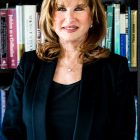Deena Metzger reviews the novel “Darwin’s Ghosts” by Ariel Dorfman, not quite a coming of age story or hero’s journey, but a journey where a young boy must learn who he is outside of the superficial life to which he presumed he was entitled
Arts & Cultural Critique
Becoming Each Other: Why We Need Riva Lehrer’s “Golem Girl” Right Now
|
Phillip Barcio reviews Riva Lehrer’s new memoir “Golem Girl.”
Reviews
Lynnda Targan’s Funny, You Don’t Look Like a Rabbi
|
Letty Cottin Pogrebin, a founder of Ms. Magazine and author of Deborah, Golda, and Me: Being Female and Jewish in America, reviews Funny, You Don’t Look Like a Rabbi, Lynnda Targan’s intimate new memoir about her arduous yet intrepid journey to fulfill her mid-life calling.
Uncategorized
The Scholar as Poet: Remembering Geoffrey Hartman
|
The work of the longtime scholar, writer, and prolific poet is revered in reflections on a long-time scholarly and personal connection by one of America’s wisest interpreters of 20th and 21st century culture.
32.3 Summer
Transformative Language in the Desert, a review of Moses: A Human Life, by Avivah Gottleib Zornberg
|
Aviva Zornberg’s ‘Moses: A Human Life’
2015
State Terrorism in the West
|
The United States and Terrorism: An Ironic Perspective
Ron Hirschbein
Rowman and Littlefield, 2015
This is a deeply insightful analysis of how self-destructive and dangerous to all humanity U.S. responses to and engagements with terrorism have been. For many decades, Ron Hirschbein has been an intellectual architect of Concerned Philosophers for Peace. He asserts that the U.S. campaign against terrorism has helped produce the very violent world it was supposed to prevent. Terrorism is most widely understood as the intended infliction of violence upon noncombatants or civilians, so it is ironic that most of the Western media fail to notice that the United States and its allies have been engaged in terrorism since World War II, despite sanctimoniously condemning the terrorist actions of others. Hirschbein gives us an alternative history of the past seventy years.
2015
The Psyche in Psychedelic
|
Entheogens, Society & Law: Towards a Politics of Consciousness, Autonomy & Responsibility
by Daniel Waterman
Review by Stephen Mo Hanan
2015
Beyond Self-Blame: Destigmatizing Unemployment
|
Flawed System/Flawed Self: Job Searching and Unemployment Experiences
by Ofer Sharone
Review by Amy Mazur
2015
Structure Without Hierarchy: Effective Leadership in Social Change Movements
|
It’s impossible to create activist spaces where everyone is equally powerful. Instead, we can acknowledge and encourage different paths to power.
2015
The Power of Service
|
Leadership doesn’t have to be patriarchal. Remembering that leadership is service will help social movements resist the tyranny of structurelessness.
Books
The Tale-less Hoffmann
|
Moods is time well spent, all the more so for not letting you forget that you were going to spend it anyway.
2015
Jewish Thought
|
Human Nature & Jewish Thought
Alan L. Mittleman
Princeton University Press, 2015
Jews and Genes: The Genetic Future in Contemporary Jewish Thought
Edited by Elliot N. Dorff and Laurie Zoloth
Jewish Publication Society, 2015
One of the popular ways to dismiss plans for healing and transforming the world is to assert that the distortions we see in the contemporary world are an inevitable outcome of a fixed human nature. In his careful examination of Jewish thought, Alan Mittleman insists on the centrality of moral personhood not constrained by any set of conditions external to the process of ethical reflection and intuition. Not only are reductionist programs incoherent, he argues, they are also absurd. He argues for real freedom and transcendence but simultaneously insists on our human limitations: “We are holy—and capable of unimaginable evil.” Holding both, he suggests, is one of the great strengths of the Jewish tradition. Some genetic diseases are more prevalent among Ashkenazic Jews than among the general population, largely because Jews were always a small population and historically predominantly married only other Jews.
2015
Four Texts on Capitalism and Humanity
|
by David Cleveland, Charles Eisenstein, Arundhati Roy, and David Fideler
2015
Writing and Spirituality
|
Nobody Home: Writing, Buddhism, and Living in Places
Gary Snyder, in conversation with Julia Martin
Trinity University Press, 2014
Nobody Home presents three interviews conducted by South African scholar and writer Julia Martin with the poet Gary Snyder that take place from the late 1980s to 2010, along with a selection of letters between them covering the same period. Martin was a young academic in apartheid South Africa when she first reached out to Snyder, motivated by her critical work on his poetry and thinking. Martin’s study and practice of Buddhism and her intuitive grasp of Snyder’s importance as a forefather of a growing international movement of spiritual environmentalism provoked Snyder to respond with sympathy and encouragement. They had an instant rapport in letters, which led to the interviews. This is a great period for Snyder, as his thinking about the nondualism of self/no-self and its relation to the world and all phenomena is culminating in his concentration on finishing Mountains and Rivers Without End, one of the crowning works of his generation of poets.




